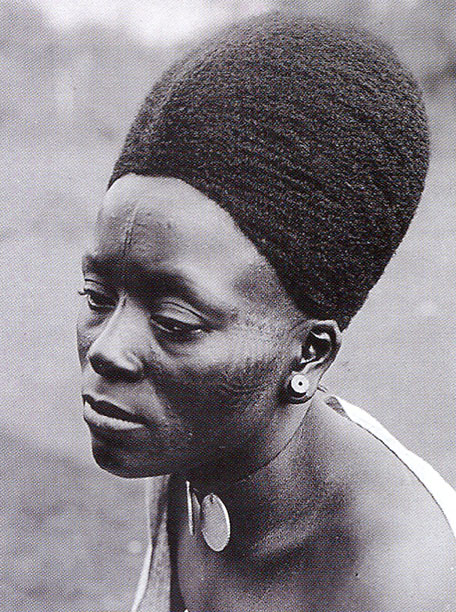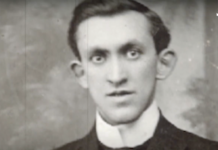By Robert Adamou Pindzié —
She flashed like a lightning bolt out of the darkness with a brilliance that instantly lit up the court of King Njoya in Cameroon. Her light burned brightly, blazing a path down country lanes and city streets as a remarkable evangelist who proclaimed a new and living faith.

Lydia Mengwelune was the second and most beautiful daughter born to a nobleman. In spite of her young age, she was given as a bride to Bankumbu, one of the king’s leading generals. Since she had not yet reached the required age for marriage, she entered the harem of her fiancé.
The king discovered that Bankumbu was part of a group that was plotting against him. The king had him killed, even though he had served the king for a long time, and protected him from many attacks. In his anger, the king killed Bankumbu’s mother and brother on the same day. The entire town of Foumban was terribly upset by this slaughter.
Lydia had barely overcome the pain and fear caused by this brutal act when another, even more violent tragedy struck. Her father was falsely accused of having killed his neighbor. The accusation came from a soothsayer who consulted the trapdoor spider, considered to have the power of revealing secrets.
Upon hearing of the matter, the king sentenced Lydia’s father to hang immediately. As a result of that judgment and execution,Lydia’s family was banished, and were liable to be sold to anyone, according to the king’s wishes.
However, the Queen Mother intervened on the family’s behalf so that Lydia’s mother and her children, as well as all of their possessions, would come to no harm.
Lydia began to accompany her mother on visits to the palace. Having noticed Lydia’s beauty and intelligence, the Queen Mother asked if she could keep her there and see to her education. Lydia’s mother gratefully accepted.
Dancer to the king
While she lived at the palace, Lydia received all the benefits of being under the care of the Queen Mother. She was given clothing, shoes, finery, beauty oils — even a special diet. She lacked nothing. People began to admire Lydia’s grace, courtesy and intelligence.
Since the king visited his mother every day, he soon saw the incredibly beautiful Lydia and began to love her in spite of the edict against such things within an extended family. Even with the power the king enjoyed, he could not marry her, as he would be accused of incest. Nonetheless, he was unable to resist her charms. For this reason, the Queen Mother advised him to make Lydia his concubine.
Lydia began to serve the king, much to the detriment of all his wives. The other wives grew jealous and began to despise her.Lydia sought to please the king’s every request. In return, he gave her so many gifts that his other wives hated her even more.
Like the other royal concubines,Lydiahad lodgings in a house next to the palace.Lydiawas not only beautiful, but she also knew how to dance, and the art of the dance was very much admired by her people. Her silhouette and her gestures captivated the king when she performed.
Freed to serve another King
At the palace,Lydia had a privileged position: she was King Njoya’s principal conversation partner. He told her about many events, and often discussed them with her. They had spoken at length about some German merchants that visited Cameroon. The Germans wanted to collaborate with King Njoya, and they came to him with an offer of friendship from their government.
A man named Samé – one of the merchant’s employees – began telling others about the God who had sent his son to save the world. Having heard these strange stories, King Njoya called the man and made serious inquiries about this message. He also had the stories transcribed into his language.
He was so interested in knowing about this God that he offered Samé money so that he could stay and teach the Bamoun people. He declined the offer and said that messengers from God would come one day. Samé went on his way, and no one knows where he went.
Later, two young men went to Bali for schooling. In addition to learning how to write, they learned many wonderful stories from the Bible. When they returned to Foumban, they told their family about what they learned, and the stories were circulated until they reached the king. Having listened to these young people and having been touched by hearing stories that were unknown among his people, the king sent the pair back to Bali to ask the missionaries if they would come and teach these stories to the Bamoun.
A German pastor from the Basel Mission named Martin Gohring arrived in Foumban in response to the king’s request. The excitement this caused could be felt in the whole city. King Njoya gave him a gift of land on the highest hill in the city. He quickly had lodgings and a school constructed, as well as a church in the central marketplace.
The king himself listened attentively to the sermons. He also told his wives and his daughters to attend the meetings regularly. Lydia attended the meetings and more than all the other women, was moved by what she heard.
Shortly thereafter, the king sensed that a great change was taking place in Lydia’s heart. She didn’t seek his presence as often as before. She could often be seen alone, lost in her thoughts, crying. She never missed a worship service, but little by little, she was moving away from the king.
One day she appeared before the king and humbly but firmly told him: “I have been going to the worship service of the Christians every Sunday. They say many good things, and their words have entered my heart. Their God says: ‘Happy are those who have a pure heart,’ but I do not have a pure heart, and I have done much wrong. The king’s wives hate me, and they are right to do so. I can no longer be the king’s friend. May he give me away in marriage to a good man!”
This came as a cruel blow to King Njoya. He begged and pleaded with Lydia, and gave her many presents and caresses, but nothing could change her mind. The king’s efforts were of no account to the young lady because her very soul was in torment about the new message she had heard. He was all the more astonished and disappointed when Lydia told him that she wanted to become a Christian and that she was now taking classes that would prepare her for baptism.
Light comes to Nji Wamben
Lydia became the 31st wife of Nji Wamben, a nobleman who was in the king’s service. Her husband hoped that she would help him get closer to the king. He knew that his wife had adopted the Christian faith, and he allowed her to attend the worship services even though he did not attend himself. He believed that in time, her zeal for the Christian faith would fade.
In the meantime, Lydia became a student of the Bible, and she grew rapidly in her faith. The more she understood, the more she allowed older practices that were not in keeping with the Word of God to fall away, such as making sacrifices to the dead.
She rejected the false beliefs about the trapdoor spider, a belief that brought about the death of her father. She no longer feared spirits, witchdoctors, and the evil eye. God was now in charge of her life. Her contemporaries and those who were baptized with her recount that her faith and her love were vibrant.
All the progress in her spiritual life and the knowledge she had gained from the catechism led her to be among the first 80 Bamoun candidates for baptism. It was at this time that she was given the baptismal name of Lydia, because she also could say, “The Lord has opened my heart.” She was baptized by Pastor Gohring.
Persecution and Witness
Lydia’s husband, Nji Wamben, became exasperated by the commitment his wife made to the Christian faith. He pleaded with her saying, “Please don’t cause me this grief and shame; do not leave aside the customs of your fathers.” King Njoya began to incite Nji Wamben to persecute his wife. He began to treat Lydia cruelly, and progressed from reproaches and humiliations to threats and actual physical torture.
He had Lydia removed from her beautiful house and gave her a servant’s hut to live in. The other wives made fun of her and treated her with contempt. Her right to receive help from the slaves was taken away, and her husband no longer paid any attention to her except to call her so that he could vent his anger over anything that happened that might be her fault. He even beat her and she was left with permanent scars.
She shouldered her trials just as she carried her cross, finding comfort and consolation in the Word of God. In time however, her living conditions became unbearable. She went to one of the German missionaries there, and said, “Take me as your servant girl. I cannot stand to live with my husband any longer.”
This woman told her to honor her Christian faith in the circumstances she was in, and that Jesus would help her more than she could help herself. The missionary went to speak with Lydia’s husband, and found him to be embarrassed by the fact that he loved his wife, but hated Christianity. Pressured by other noblemen, he continued to mistreat Lydia.
During the First World War, the German missionaries left Foumban. Lydia cried out as they left, “I am like an orphan now, an orphan!” “God is your Father, dear Lydia, and Jesus your advisor,” answered one.
After the war, one persecution followed another. King Njoya outlawed the practice of the Christian faith in his kingdom and converted to Islam. He asked that all his subjects become Muslim, just as he had. Muslim husbands who held high positions in the royal court found themselves forced to persecute their Christian wives in order to keep favor with the king.
On several occasions, churches were attacked by government officials, who had their wives taken away in a violent manner. In spite of her own suffering, Lydia sought out the persecuted and gave them strength and courage. She braved humiliation in her own situation, and her life became her confession of faith. Through her witness, the other wives of her husband came to faith in Jesus Christ.
Lydia’s husband said, “Ever since my wives became Christian or started to attend the teachings, life in my house has changed a lot. I don’t hear quarreling any more, only joyful singing, and the work gets done peaceably and well. Basically, everything is better than it used to be.”
That is how Lydia, who was a persecuted Christian wife, changed the outlook and the beliefs of her husband Nji Wamben, his wives, their children and their servants. They had formerly held to traditional religion, then they became Muslim, and finally, thanks to the light of Christ, they all became Christians.
For a long time, Lydia continued to teach the faith to generations of Bamoun Christian women whose lives were transformed, and who influenced their marriages, their children, and their society.
Itinerant Evangelist
Lydia was chosen as an elder because she exercised her gift for evangelization. Jean Njimonia writes: “She became an elder because she loved to serve. The church has had women elders and still has them, but Lydia was an elder par excellence. She visits our neighborhood churches and gives good counsel to catechists and Christians alike. She knows how to comfort brothers who are afflicted. She feeds orphaned children that she has taken in of her own free will. She has taught many catechists’ wives.”
Lydia did not only preach, as is often the case with evangelists. What she taught was made real through her actions as well. She cared for sick Christians and catechists alike, giving them encouragement. She received women who had been persecuted and chased from their homes because of their faith, and saw to their protection. At times, there were four young women living in her house, and sometimes more.
If someone in the church had left town because of persecution or had been temporarily put out of the community of faith because of sin, Lydia had no peace until she went out and found that person. Sometimes, she even brought them home with her. In light of her social standing, she was not allowed to walk the paths of neighboring villages alone, so Nji Wamben gave her some servants, and they would always go with her.
Lydia’s zeal for evangelism makes it clear that her faith was not simply a question of vocation. She belonged so totally to her Lord that everything she did was of an evangelistic nature. Lydia’s faith was active in service and was evident in the loving things she did for others, all to the greater glory of God.
The Meaning of Jesus Christ in Her Life
Who was Jesus to this woman who committed herself body and soul to serve Him, even at the risk of her life? What follows is one of the last accounts of her beautiful profession of faith in Christ:
In 1924, as the 14th of July grew near, the king called his chamberlain and told him: ‘Talk to your wife, Mengwelune, and tell her to dance for the white people’s holiday.’
Nji Wamben told me himself that his answer to the king was: “My King knows very well that Mengwelune is a Christian and that Christians do not dance. How can I tell her to do what the king commands?” So Njoya sent two messengers to plead with her, that she might do the king’s bidding. He also promised her goats, palm oil, corn, peanuts, and the most beautifully made scarf from the royal looms.
Lydia laughed when she received the message, thinking that it must be a joke. A little later, she realized that it was a serious proposition. This was her answer: “Go and tell the king that Mengwelune needs her feet and her hands, as well as her body and her heart, for her service to God.” The king did not insist any further.
Lydia had a few laughs over that request and was able to show in that incident how foreign all those things were to her now, all those things that used to make her so happy.
Through such incidents, Lydia was able to help the king and her husband — two men who were friends, but who had persecuted her – to understand who Jesus Christ was for her. By staying faithful to Jesus, she shared the Gospel with her husband – he who had humiliated and mistreated her – and he eventually came to faith in Christ.
An anonymous source once cried out: “Is there anyone among all the missionaries and all the Christians who has not praised Lydia for her great faith and for her love in the service of God? She is the only native Christian woman whose name is known both here and in Europe, as well as in America and everywhere else. May our Lord keep sending such women elders to his poor Bamoun church! What a great native Christian!”
The memory of Lydia Mengwelune is still very much alive, especially in Foumban, but also in the whole Bamoun region. Generations of Christians have been born and have multiplied through the witness of this faithful disciple. The church in the Bamoun region could count 35 places of worship in 1931, and it grew into two Synods: North Noun (principal center at Foumban), and South Noun (principal center at Foumbot). The church in Foumban is proud to have the first mega-church of Cameroon: called “Ndaambassie,” it seats more than 14,000 people. Such is the fruit borne by Lydia Mengwelune, who has gone on to rejoice with her Lord in His Kingdom. — Edited by Mark Ellis
Source: Dictionary of African Christian Biography Robert Adamou Pindzié is a Project Luke Fellow in residence, Faculté de Théologie Évangélique du Cameroun (FACTEC)
If you want to know God personally, go here




Beautiful history
Linda história que Deus continue levantando mulheres como Lydia!
This is so beautiful and encouraging, very much like the story of Queen Esther. I wish that every young Christian woman could hear of this brave concubine who was strong in her faith like a lion, yet humble as a lamb. I encourage anyone reading this story to post it on FaceBook, and to email it to all the Christian females they know!
Comments are closed.